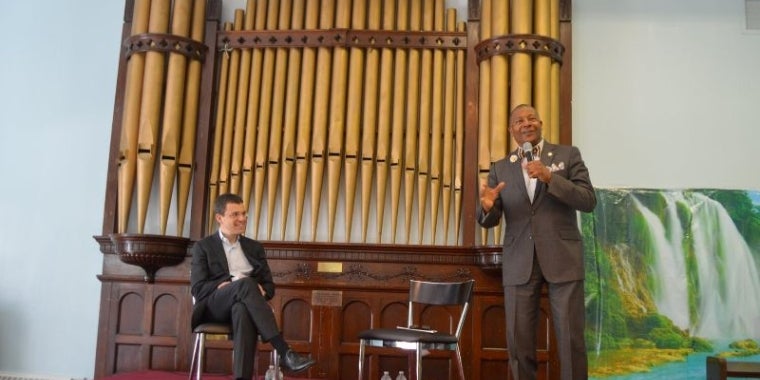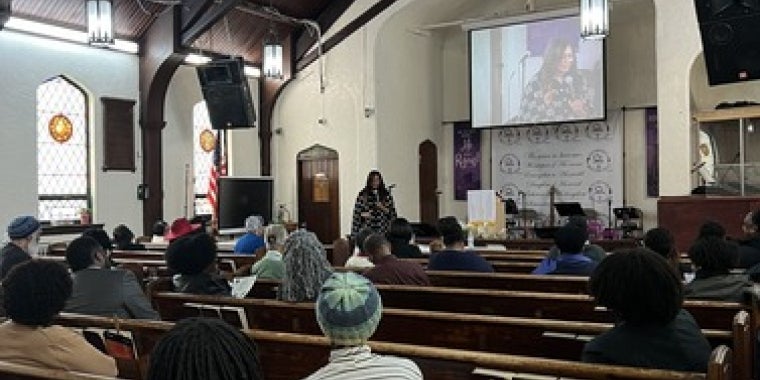
Senator James Sanders Jr. Hosts "Banking for the Invisible Class" Info Session on Lending and Access to Capital
May 3, 2019

Senator James Sanders Jr. (D-Rochdale Village, Far Rockaway) hosted an event titled "Driving Capital to the Invisible Class," on May 2, 2019 at Springfield Gardens United Methodist Church. It focused on the different lending opportunities available for those who have been overlooked by mainstream banking institutions.
The goal was to bring together the invisible class, the financial industry and some of the leading lending associations to explore the ways people can access capital. The invisible class is a term used to describe a population within a capitalist society whose needs are almost unmet and unseen.
As the Chairman of the Senate's Committee on Banks, Senator Sanders is fully committed to being a strong voice for all people, examining the fruits of past policies and the operation of banking in a marketplace economy.
“The battle is to figure out how to get the unbanked, banked.” Sanders said. “The battle is to figure out how we can help the poor become less poor, become middle class or anything else they desire. One of the roadblocks in this battle is institutional racism - systems that have grown used to not doing things. Studies have shown that if a white person and a person of color, who are equally matched, apply for a loan, the white person is far more likely to get the loan than the person of color. There’s something wrong here, and we have to find new ways. If that means we have to think outside of the structure of traditional banking, then that’s what we are going to do. We have to find ways of ensuring equality of opportunity in New York City, in New York State, and, indeed, America.”
City Comptroller Scott Stringer offered opening remarks at the event and, he too, spoke about the importance of diversity and equality of economic opportunity, and holding the city accountable to Minority and Women-Owned business Enterprises. Of the $20 billion spent every year by the city on procurement, only 5 percent of contracts go to MWBEs, Stringer noted.
“The goal for investment is about creating wealth, in every community,” Stringer said. ‘The truth is the financial institutions in this city and this country have had a very narrow view of what investment is all about.”
The centerpiece of the event was a conversation between Senator Sanders and Max Levchin, CEO at Affirm, Inc., an investor and advisor to emerging technology companies. Founded in 2012, Affirm operates as a financial lender of microloans for consumers to use at the point of sale to finance a purchase. The company allows consumers to buy goods or services offered by online merchants and then pay off what they owe through fixed monthly payments. Users can select Affirm as their payment method at checkout, fill out fields for a real-time decision, chose the payment plan that fits their budget, and process their order.
Levchin explained that the primary source of revenue for many lending institutions comes from high interest rates and late fees, which he called “evil.” These credit contract rules and regulations are often printed in small font and are meant to be confusing in order to mislead consumer. Levchin also spoke about how some stores offer their own credit cards at zero interest for a certain period of time, but if the debt is not paid off in its entirety by the end due date, the cardholder gets hit with all those prior months’ worth of accumulated interest.
“We never charge a penny of late fees. We never charge a penny of compound interest. We never charge any penalties of any kind, and low and behold, it turns out that actually works,” Levchin said. “People love us. We have very high consumer attraction scores. It’s possible to run this kind of business without screwing people.”
There were also two panel discussions – Local Access to Capital and Credit Services, and Financial Education and Wellness. As many panelists pointed out, not all credit is created equal, and there are good lenders and bad lenders. The bar must be raised regarding transparency and disclosure so that consumers can make better decisions. Many people sign loan or credit agreements without reading the stipulations.
“It’s about education,” said Phil Goldfeder, a former NYS Assembly Member, and now the Senior Vice President of Public Affairs for Cross River Bank. “Who are you borrowing from and what are the terms? This is key information you need to know in order to end the cycle of debt.”
Even though community banks have been closing, financial technology and online lending is increasing access to credit, panelists noted. The three key components to funding are credit, capital and character.
“If a lender doesn’t ask you any questions and just hands out loans, they are probably irresponsible and bad actors,” said Lina Jun, Associate General Counsel at OnDeck, and NYC-based online lender serving small businesses across the country. “Know what you’re signing up for before it’s too late.”
Other topics of discussion included the Community Reinvestment Act, legislation which states that banks should lend a certain amount of money to people who live in the neighborhoods where the banks are located; and the 504 Loan Program offered through the Small Business Administration. This loan is designed to provide financing for the purchase of fixed assets, which usually means real estate, buildings and machinery, at below market rates.
Share this Article or Press Release
Newsroom
Go to Newsroom


